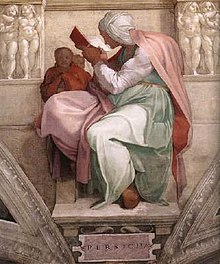This article needs additional citations for verification. (January 2014) |
The Persian Sibyl – also known as the Babylonian, Chaldaean, Hebrew or Egyptian Sibyl – was the prophetic priestess presiding over the Apollonian oracle.


The word "Sibyl" comes (via Latin) from the ancient Greek word sibylla, meaning "prophetess". There were many Sibyls in the ancient world, but the Persian Sibyl allegedly foretold the exploits of Alexander of Macedon. Nicanor, who wrote a life of Alexander, mentions her.[1]
The Persian Sibyl has had at least three names: Sambethe, Helrea[2] and Sabbe.[3]
Sambethe was said to be of the family of Noah.[4] The Persian Sibyl by Guercino hangs in the Capitoline Museum in Rome.
Pausanias, pausing at Delphi to enumerate four sibyls, mentions a "Hebrew sibyl":
there grew up among the Hebrews above Palestine, a woman who gave oracles named Sabbe, whose father was Berosus and her mother Erymanthe. Some say she was a Babylonian, while others call her an Egyptian Sibyl.[5][6][7]
The medieval Byzantine encyclopedia, the Suda, credits the Hebrew Sibyl as the author of the Sibylline oracles, a collection of texts of c. the 2nd to 4th century which were collected in the 6th century.
See also
editReferences
edit- ^ "ANCIENT SACRED WORKS OF THE HEBREWS – SIBYLLINE ORACLES-appendix with early Christian commentary". Skeptically.org. Retrieved 2013-06-26.
- ^ Manas, John H. (2004-09-01). Divination Ancient and Modern: An Historical Archaeological and ... – John H. Manas – Google Boeken. ISBN 9781417949915. Retrieved 2013-06-26.
- ^ Collins, John Joseph (2001). Seers, Sibyls, and Sages in Hellenistic-Roman Judaism – John Joseph Collins – Google Books. ISBN 9780391041103. Retrieved 2013-06-26.
- ^ Mastrocinque, Attilio (2005). From Jewish Magic to Gnosticism – Attilio Mastrocinque – Google Books. ISBN 9783161485558. Retrieved 2013-06-26.
- ^ Pausanias, x.12
- ^ Parke, Herbert William (1988-01-01). Sibyls and sibylline prophecy in classical antiquity, Herbert William Parke. ISBN 9780415003438. Retrieved 2013-06-26.
- ^ Collins, John Joseph (2001). Seers, sibyls, and sages in Hellenistic-Roman Judaism, John Joseph Collins. ISBN 9780391041103. Retrieved 2013-06-26.
External links
edit- Media related to Sibyl of Persia at Wikimedia Commons